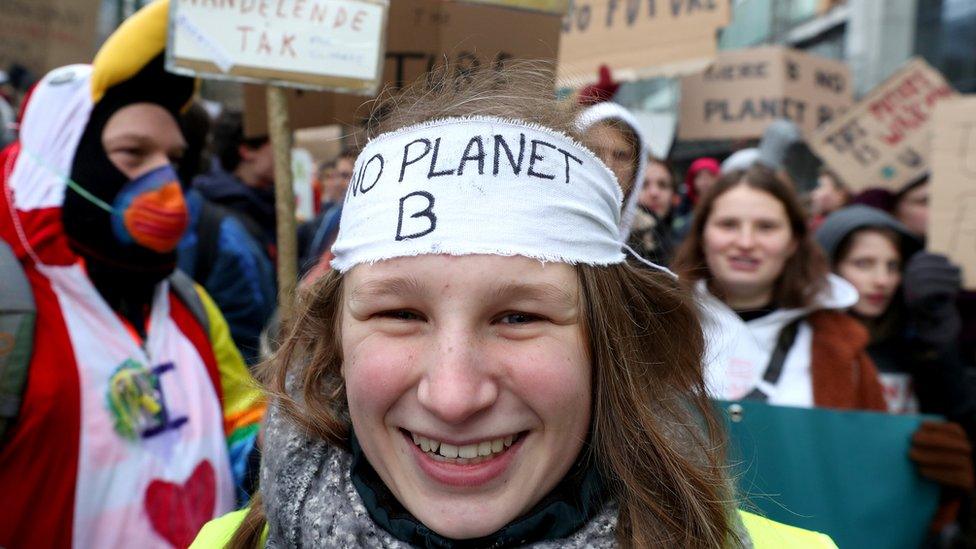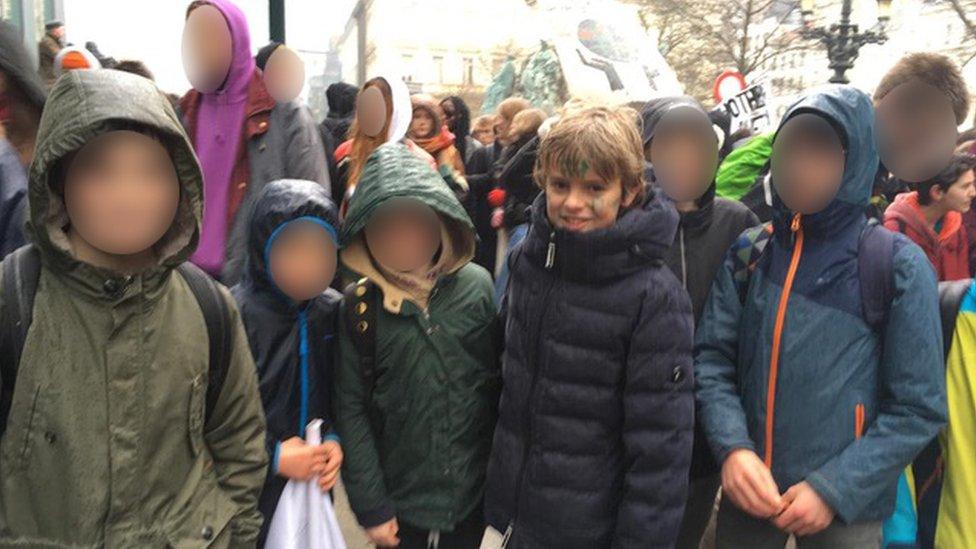Belgium climate protests: Children skip school to demonstrate
- Published

For a fourth week, tens of thousands of children have skipped school in Belgium to join protests demanding tougher action against climate change.
Ahead of the marches in Brussels, Liège and Leuven, dozens of children protested outside the home of Belgium's environment minister.
New impetus came in an open letter from 3,450 Belgian scientists saying "the activists are absolutely right".
Youth demonstrations have also taken place in Germany and Switzerland.
More than 30,000 students and others turned out in three Belgian cities, slightly down on last week.
The biggest number, according to police, was in the eastern city of Liège (Luik in Dutch) where 15,000 people marched to the city hall. Protesters clapped and chanted "to arms" and "everyone together", said local journalist Benjamin Hermann.
Allow X content?
This article contains content provided by X. We ask for your permission before anything is loaded, as they may be using cookies and other technologies. You may want to read X’s cookie policy, external and privacy policy, external before accepting. To view this content choose ‘accept and continue’.

Another 12,500 children turned out in Brussels and a further 3,500 in Leuven (Louvain in French). In Brussels primary and secondary schoolchildren were marching through the city centre from north to south, and they were joined by groups of grandparents.
Allow X content?
This article contains content provided by X. We ask for your permission before anything is loaded, as they may be using cookies and other technologies. You may want to read X’s cookie policy, external and privacy policy, external before accepting. To view this content choose ‘accept and continue’.


Why are young people marching in Belgium?

Isidore Vlassenroot participates in a march with friends
Isidore Vlassenroot, 12, at school in Ghent: "I am marching because I believe we should make our voice heard as young people. It is very special to be part of such a huge crowd. We all have the same goal: a better planet. So many children wanting a better planet is something very unique. We have four ministers and no climate policy, which is very sad."
Koen Vlassenroot, Isidore's father: "This is a unique moment in Belgian history and I'm glad my son is part of it. We as parents have the moral duty to support them; they show the courage our generation lacked, and now stand up to protect their future and demand [politicians] act more responsibly. I agree that he is missing school, but being part of such a movement is very educational. I want my son to be conscious about challenges such as climate change."
Luka De Wever, 17, sister of protest organiser Anuna De Wever: "All over the country, people are gathering to march and get the attention of the politicians to change their policy. I am very proud of what my sister has done together with Kyra [Gantois, another protest organiser], Greta [Thunberg, Swedish climate-change protester] and many others. Either we act now or there will be no more time to. I believe we will be able to make a difference, not only in Belgium, but all over the world."

Students have also been mobilising on Fridays in Germany and Switzerland, under the hashtag #FridaysForFuture, external
At the weekend, tens of thousands of adult protesters marched in cities across France as well as Belgium with the aim of holding monthly events.
But each country has different issues.
Germany has committed itself to phasing out nuclear power by 2022, and at the weekend its coal commission recommended shutting down all coal-fired power stations by 2038.
Belgium has ageing nuclear power stations at two sites near Antwerp and Liège and has increased its reliance on imported energy.
Allow Instagram content?
This article contains content provided by Instagram. We ask for your permission before anything is loaded, as they may be using cookies and other technologies. You may want to read Meta’s Instagram cookie policy, external and privacy policy, external before accepting. To view this content choose ‘accept and continue’.

Allow X content?
This article contains content provided by X. We ask for your permission before anything is loaded, as they may be using cookies and other technologies. You may want to read X’s cookie policy, external and privacy policy, external before accepting. To view this content choose ‘accept and continue’.

In their open letter, the Belgian scientists said they wanted to provide facts, accusing opponents of disrupting the debate.
Leading Flemish politician Bart De Wever reacted to last Thursday's march in Brussels which attracted 35,000 people, urging children "not to believe in the apocalypse" but to have "confidence in the future and in the power of innovation".
The scientists said that technology to cut carbon dioxide emissions already existed but there was a need for political courage to take the necessary structural measures.
The young activists want world leaders and corporate bosses to stick to the ambitious goals agreed in Paris in 2015.
The school strikes were the brainchild of 16-year-old climate-change protester Greta Thunberg, who attracted widespread coverage for an appearance at the World Economic Forum at Davos in Switzerland last week.
"My message was that most emissions are caused by a few people, the very rich people, who are here in Davos," she told the BBC.
- Published25 January 2019
